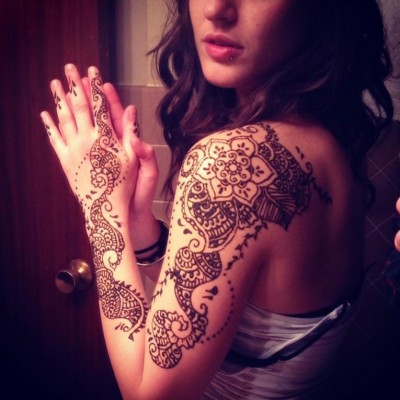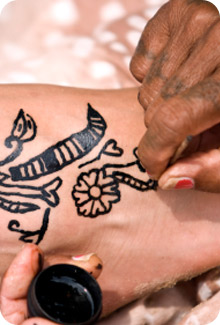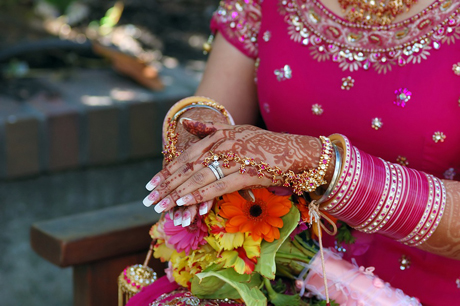By Bhupi Rajput @henna4you & online at www.henna4you.com

Bhupi Rajput, Henna artist, owner Henna4u
Let me introduce myself. I’m Bhupi Rajput and have been practicing the Art of Henna for some 17 years. I was born in Nairobi, Kenya, move to London, England when I was 11 and then to Cambridge, Ontario in 2004. I studied Marketing and Business Management and graduated with a BSc with Honours at South Bank University.
I worked at a very well established financial consultancy for many years, got fed up with the rat race and working a 80-90 hour week. That’s when I decided to do something drastic and backpacked in India for two years where I learned the art from a nine-year-old girl, in the small village of Pushkar and haven’t looked back since.
Why am I writing this article you ask?
Well, over the last few years and especially the past six months, I have repeatedly been asked by brides, their mum’s and groom’s mum’s that they only want to use “black henna” for their event. I will never use black henna or add any chemicals to my henna paste and have refused to work on clients. One mum said “The girls in Toronto are doing it, why can’t you?” They look at it as fashion and what’s trending and don’t realise the horrific consequences. This is simply terrifying because our parents, peers and family believe that black henna is natural.
Every weekend, I participate at festivals and fairs all over Ontario and to date, I can guarantee that there are always people, usually Indian background asking for black henna tattoos. Henna or mehendhi is a beautiful piece of artistry and the cultural aspects dates back thousands of years.
I want to set the record straight once and for all about any misconceptions in our community of the supposedly different types of “natural” henna.
Why does henna only give a red/brown stain?

Photo: Courtesy Henna4u
In order to answer that, we need to understand what henna is and where it comes from. Henna or mehendhi are the leaves of the henna plant (Lawsonia Inermis) which are picked, dried and then crushed to produce a fine green powder.
Henna4You is proud to say that our paste is 100% natural with no additives or preservatives. We mix the paste ourselves using henna powder, lemon juice, tea tree oil and sugar. Once mixed, it has a shelf life of only 10 days. After that it goes bad as any food would if left on
the counter or in the fridge.
Now, remember those henna cones you buy at the grocery store? They’ve been sitting on the shelves for months or years sometimes, how does the colour stay so strong and rich? The answer is simple – chemical dyes.
It takes natural henna 24-48 hours to reach its peak colour. So for the first 10-14 hours it will be orange. Every time I adorn the bride and their guests, I always get asked two questions
- “The colour is not showing, why is it still orange?
- Are you sure the colour will come out for the wedding?”
So, here’s the science stuff: it’s a simple process. Henna works with the heat and chemistry of our body. The warmer we are, the darker the colour of the mehendhi which is why I advise all my brides to stay warm with very specific instructions after the application. The colour is also affected by stress, time of the month, medication, etc. It’s a natural dye which reacts differently with each individual.
Unfortunately, today’s society is so used to instant gratification as everything is available at our fingertips. If we can’t afford it, it goes on credit. Gone are the days of having to save for anything. That is what has happened with mehendhi. Our parents and peers want instant colour which is not possible from a natural product.
So what is the difference between natural and black henna?
Natural Henna
- The paste will be green.
- Smells earthy and is nature based.
- Gives a red brown stain.
- Contains NO chemicals, additives or preservatives.
- Will only stain the skin.
- Is safe for babies and expecting mums.
- Is safe to use on animals.
vs Black Henna

Black Henna Photo: Health Canada Website
- The paste will be black.
- There is no such thing as natural black henna.
- Stains black and stays black.
- Has a very strong odour and smells like a chemical or some may not have a smell at all.
- May contain gas, paraffin, turpentine, PPD (Hair Dye). We wouldn’t use hair dye without wearing gloves, so why would you want to apply it onto your skin.
- It can enter the blood stream.
- Can cause serious allergies and long-term health issues.
- Can cause THIRD degree chemical burns.
- Can cause years of scarred tissue from the burns.
Black henna application
Nothing upsets me more than these people using “black henna” who are out to make a quick buck at somebody else’s expense. They’ve turned a beautiful art form into a commercial money grabbing business that devastates lives.
These folks hang around at holiday destinations all over the world including; Cuba, Mexico, Europe, USA, even Canada. And the so-called bridal artists that lurk in our communities.
Even brown henna can contain chemical dyes to make it go darker, which is why it’s so important to ask for a list of their ingredients.
Health Canada has issued a warning on their website recently.
One parent said, we’ve been doing this in our country for years and the Government is only trying to restrict our cultural believes. I was astounded. A recent article in the Global News shared a man’s distress as he endured second degree chemical burns. Photo Courtesy of Health Canada website
 Tips you may want to use:
Tips you may want to use:
- Always ask the artist for a full list of their henna paste ingredients. They don’t have to share the proportions as those are sacred to them. Alarm bells should go off, if they are unwilling to share or keep dodging the question or say its 100% natural. They should be able to list every ingredient and if they can’t, they don’t know or there is something in the paste they don’t want to share.
- Do NOT use henna oil – it is a mixture of turpentine and other chemicals that you do not want on your body. The ingredients are never on the bottle and it’s highly risky.
- If you are ever in doubt, walk away. It’s not worth the risk.
I hope you will share with your family and friends and if you want more information, please visit our website www.henna4you.com or call 519 741 7007
This article is for informational purposes only, please consult your physician for further health information.
©masalamommas and masalamommas.com, 2016-2017. Unauthorized use and/or duplication of this material without express and written permission from this site’s author and/or owner is strictly prohibited. Links may be used, provided that full and clear credit is given to masalamommas.com and Masalamommas online magazine with appropriate and specific direction to the original content.



What an interesting piece, not to speak of crucial health info. Thank you for enlightening those of us who had no idea.